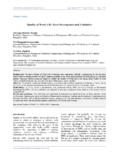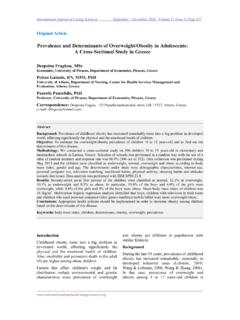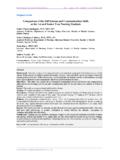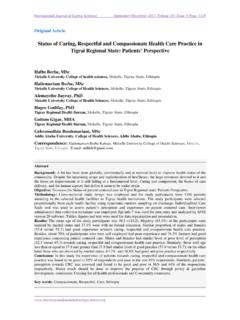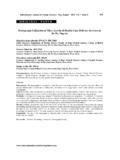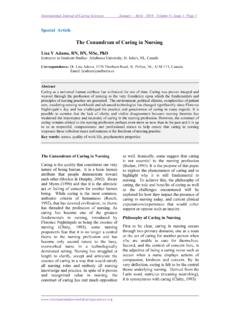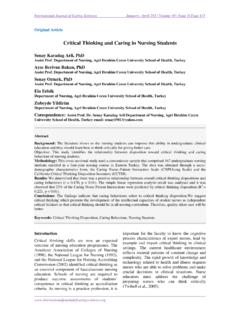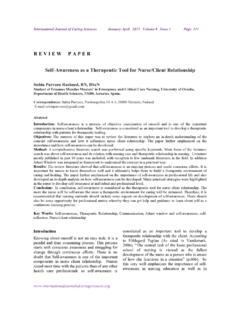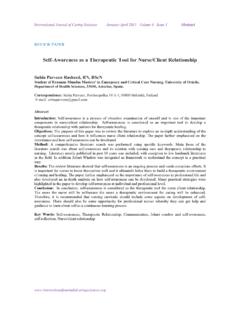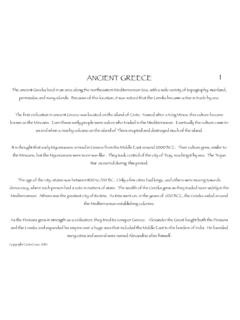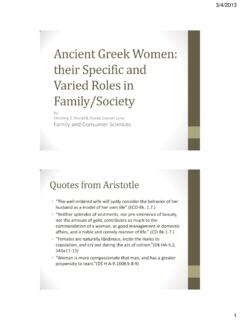Transcription of Nursing and Caring: An Historical Overview from Ancient ...
1 International Journal of caring Sciences September-December 2015 Volume 8 | Issue 3| Page 791 Special Article Nursing and caring : An Historical Overview from Ancient Greek Tradition to Modern Times Dimitrios Theofanidis, RN, MSc, PhD Clinical Lecturer, Nursing Department, Technological Educational Institute of Thessaloniki, greece Despina Sapountzi-Krepia, BSc, MSc, PhD, RN, RHV Professor and Head of the Department of Nursing , Frederick University, Nicosia, Cyprus Correspondence: Dr Theofanidis Dimitrios, Alexandrer Technological Educational Institute of Thessaloniki, Sindos, 54100, Thessaloniki, greece Abstract Introduction: Nursing as a humanistic profession is closely related to the core of caring which embraces the human essence in both illness and good health.
2 This position paper examines the fundamental humanistic elements of caring and Nursing particularly from a Greek perspective. Aim: to discuss critically the implications of care delivery mainly in greece by looking at the deeper roots of these notions, within their Historical and geographical contexts. Method: a Historical literature search was undertaken in a time series snapshots methodology whereby key events and Historical contexts were critically appraised with regard to the evolution of Nursing as an art and science. Both international and national library databases were used. Results-Discussion: Just like modern medicine, Nursing also uses the Hippocratic Medical heritage as its base and therefore Hippocrates could be seen as a shared forefather for health care professionals.
3 It is often argued that in his early writings he described in detail what is now the Nursing profession as he did not mention 'nurses' but referred to doctor assistants! Nursing has now become an independent scientific discipline with discrete evidence based knowledge but certainly the care side still has powerful historic, cultural and traditional roots. Conclusions drawn from a review of the literature show that historically the roots of Nursing and caring in greece have a triple dimension. a) caring care was provided within the family mainly by members, slaves and servants. b) Wartime Nursing care was provided by private citizens but also by nobles who possessed the art of healing and caring . c) Organised Nursing care was provided in many hospitals in the early Byzantine Empire.
4 Hostels and Nursing Homes were run by monks and laity, voluntary men and women initially as a token of Christian love and later on payment. Key words: Nursing , caring , Ancient greece , Rome, history. Introduction There is an inherent difficulty in writing the history of Nursing in the area of greece because of the social context in which it has been practiced. Literature on this topic is scarce and diverse and further attempts to clarify this subject are needed in order to comprehend the current state of health care affairs. Aim The aim, of this position paper is to discuss critically the implications of care delivery in the greece by closely reviewing the deeper roots and pillars of Nursing steming from Ancient Greek caring practices, its core mission and values and the evolution of Nursing within its Historical and geographical contexts.
5 International Journal of caring Sciences September-December 2015 Volume 8 | Issue 3| Page 792 Method For this paper s needs, a Historical literature search was undertaken in a time series sequence whereby key events and Historical contexts were critically appraised with regard to the evolution of Nursing as an art and science for this specific geographical area. Key words used included: Nursing , caring , Ancient greece , Rome and history in both Pubmed and Greek databases. Results-Discussion Providing Nursing care in Ancient greece , a practice that could be argued continued until the mid 20th century, was mainly the work of women of every household. For this reason, the exercise of Nursing activities in the Ancient world could only be accessed through the social position of women throughout these periods.
6 In general, the dominant ideology at the time was that women should not have to deal with common matters or practice a profession. Under these conditions the social space where women could exercise Nursing was confined to the site of the house which, however, was dominated by the Ancient Greek proverbial philosophy: , which loosely translates to: house matters are not for the public eye or in today s idiomatic phrase: don't wash your dirty linen in public . The outcome of this social framework is that only limited and indirect references can be found in Ancient texts concerning the exercise of Nursing in Ancient greece and the Balkan area making it difficult to research and study (Sapountzi-Krepia, 2001). The notion of Nursing is closely related to the essence of caring as the philosophy which underpins the theory and practice of Nursing Science embraces the core human essence in both illness and good health.
7 As Donahue (1985) points out, to care for is not a phenomenon exclusive to Nursing but it appears in various forms across all human constructs and civilizations throughout time. Lachman (2012) defines care as ..a commitment to attending to and becoming enthusiastically involved in the patient s needs . In these lines Morse et al., (1990) argue that: If caring is to be retained as the "essence" of Nursing , and if research in this area is to advance, then the various perspectives of caring must be clarified, the strengths and the limitations of these conceptualizations examined, and the applicability of caring as a concept and theory to the practice of Nursing identified. In a philosophical analysis of the concept of 'care', Marieskind (1998) stressed that the caregivers incentives should be to remove or alleviate pain and discomfort of those they look after.
8 The empathetic adoption of this attitude when caring comes when the caregiver develops the ability to imagine experientially the plight of others that is those who receive the care as if he were in his place. Maclean and Theisen (2012) put care within an ethical framework, stressing that the provision of care is associated with a sense of morality and duty which are innate in many women, while one could also consider care to be directly related to technical aspects, educational preparedness, good interpersonal and communication skills and a moral sense towards the person who receives the care. Women and care delivery: the beginning of Nursing ? Women's involvement in health issues is an Ancient tradition in human cultures. Some evidence for this activity can be found in early Historical texts.
9 Undoubtedly there are even older unrecorded traditions but their roots are lost in the mists of time. A large part of this Historical heritage was lost as social changes confined woman to the loft , ousting women from exercising therapeutic interventions and the introduction of laws prohibiting women from formal education International Journal of caring Sciences September-December 2015 Volume 8 | Issue 3| Page 793 (Maclean 1974, Sapountzi-Krepia 1999, Sapountzi-Krepia 2013). The word nurse evolved from the Latin word nutrire which means to nourish. The nourishing aspect of Nursing prevailed throughout centuries with the roots of Nursing and medicine intertwined in Ancient eastern and western cultures and religions.
10 Still, it should be noted that even in the previous century, in much of the Balkans women were solely responsible for housekeeping and raising children. Limitations of their social role included not working outside the house and yet Nursing was perceived as a female job . In Turkish, the term nurse means sister hem ire karde (Bah ecik & Alpar 2009). Similarly, the Greek equivalent to nurse is which again means sister . Thus, provision of Nursing care was considered throughout the centuries as an internal affair of families and especially of women (Sapountzi-Krepia & Krepia 2005). In the long course as caregivers, women have sought and discovered the healing properties of herbs and other substances, which in the course of time spread by word of mouth, from one generation to the next (Laskaris, 2008).
